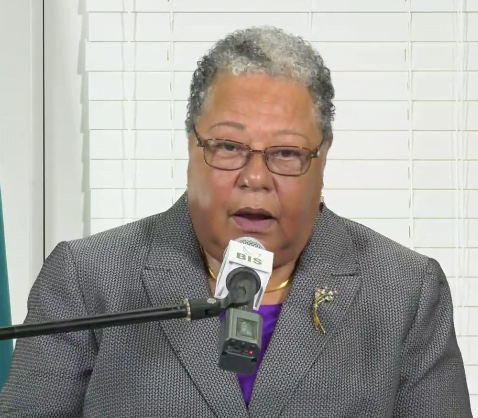NASSAU, BAHAMAS — Despite efforts to procure additional COVID-19 test kits and the components enabling those tests to be performed, The Bahamas remains challenged to offer widespread community-based testing.
During a broadcasted press conference, health consultant in the Office of the Prime Minister Dr Merceline Dahl-Regis said The Bahamas has more than 3,000 PCR tests, but noted there were fewer stocks of other components needed to complete testing.
“Test kits is just a component of the PCR testing,” she said.
“You need the RNA extraction kits; that is to take the genetic material out.
“You need the preservatives: the ethanol and the enzymes, so there are different components to the test. So, although we have 3,000 tests on-hand, we have fewer than 2,000 extraction kits and we are trying to get more.
“We do have adequate supplies of the other components for the PCR testing.
“We will always plan to have a reserve for acutely ill, suspected or symptomatic cases.
“We must balance our outreach community testing, holding a reserve, so that is how we prioritize the community-based testing.
“And we must test all contacts as well.”
Responding to questions from the media, Dahl-Regis confirmed that the Cayman Islands previously approved a request from the Bahamian government for 10,000 PCR test kits; however, these kits were offered at a “very steep price”.
“We were really challenged at that time with the lack of supplies,” Dahl-Regis said.
“You have heard about the swabs and you have heard about the kits, but what we needed when we reached out to every island, every territory in this region, we needed RNA extraction kits; not PCR kits.
“Now, they have an abundance of PCR test kits and at this time, we are looing at the cost they’re asking for them, and do we need them, and can we get them.
“We’ve gotten all of our supplies previously from vendors through a strategic fund of PAHO and that gives us very low prices.
“So, given the difference in price of those Caymanese offer of test kits — not the RNA extraction kits; in fact, they were asking us to share our RNA extraction kits at the time we were asking them for kits. But now we’re in a better position. We are evaluating the costing and how we would proceed to be sure we have adequate supplies through this upcoming period.”
In April, testing capacity was limited due to a shortage of swabs.
At the time, there were only a few hundred swabs in country.
Health officials have sought to ramp up testing to get a better representation of the spread of the virus and track asymptomatic carriers.
As of yesterday, there were 97 confirmed COVID-19 cases in The Bahamas.
To date, just over 1,900 people have been tested.
At last report there were over 250 people in quarantine.
Of those, 15 individuals could not be located.
According to health officials, the individuals in question had undergone the required 14-days in quarantine at home, but had not been retested.
Asked yesterday whether those individuals had been located, Dahl-Regis said: “In terms of the numbers of persons who we have not been able to contact, we have their names, but we don’t have the contact numbers — the telephone numbers — for them. And that has been the challenge. It still hovers between 13 and 15.”
Last week, government has signed a contract for a program that will facilitate the electronic monitoring of quarantined individuals.
The program is expected to help curb breaches of the quarantine protocols, which health officials have expressed can lead to further spread of the novel coronavirus (COVID-19).
Yesterday, Dahl-Regis said the training in New Providence had been completed and the program is expected to go live on Monday.
As it relates to Grand Bahama, Dr Frank Bartkett, advisory to the Pan American Health Organization and head of the Grand Bahama task force, said training for Hubbcat was ongoing, and implementation was aimed for as early Monday.
“Once that is implemented, we will use it to assist us in in the patients [who] are being quarantined,” he said.
As of yesterday, there were no active cases of the virus in Grand Bahama.
There were eight confirmed cases on the island.
Hubbcat Solution was selected from seven proposed digital solutions.






